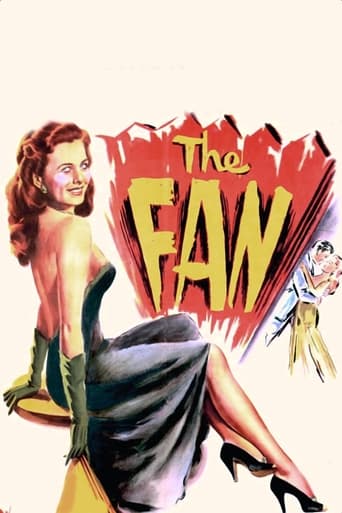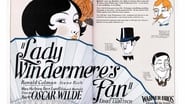clanciai
Oscar Wilde shines through all the way with his remarkable wit and knowledge of human nature, here especially about women. Dorothy Parker adding to it makes it a double treat. Here you find Oscar Wilde amazingly updated to after the second world war with its rationing and bombed ruins of London, adding an extra spice of melancholy and sadness to the glittering wit and intrigue of fin de siècle refinement. All the actors are outstanding, Otto Preminger bringing out the best of them all, not only George Sanders and Madeleine Carroll in double performances as both young and old; but also Jeanne Crain and Richard Greene are exactly adapted to their involuntary parts of having to feign their demeanour and treading uncertainly on a precarious path of extreme human delicacy. You are led to believe the worst of Madeleine Carroll at first, and indeed she is a fallen lady, but she has learned something of it and conveys the wisdom of her experience in a wondrous way according to the best of Oscar Wilde's sharp human studies. This is a film for wits to relish, and Otto Preminger surprises once again with delivering something entirely new even to his own experience.
JohnHowardReid
Alas, little is left here of Oscar Wilde's famous play, "Lady Windemere's Fan", as so much screen time is now taken up with the added present-day sequences. Nonetheless, George Sanders and Martita Hunt still have all the best lines. On the other hand, Richard Greene is so mediocre an actor, he diverts audience sympathy in the wrong directions. Otto told me it was one of the very few times in his career that he disliked a movie whilst actually shooting it. I don't agree with him. The movie is very stylishly directed and has all the hallmarks of Preminger's middle-career style, particularly in its long takes and fluid camera-work. I particularly liked the long take of Sanders and Crain on the balcony while dancers whirl (slightly out of focus) in the ball-room below. It's certainly not Otto's fault that the movie is over-cluttered with dialogue and that Wilde's wit has been drained off and that many of the players have little charisma and are just plain dull. Miss Crain, for instance, could be described as a dull actress in a dull part. Yes, in all, the movie is rather disappointing, but it's a good example of how NOT to adapt a Victorian comedy of manners. Don't try to make it topical. That just dates it all the more. When Googie Withers revived "The Circle", she actually set it BACK to the 1890s. And that was a very successful adaptation, both with critics and audiences!
howardmorley
Preferably before you watch this production I would urge all users to see what in my opinion is the definitive professional performance of this famous 1892 Wilde play which was televised in 1985 and which starred: Helena Little as Lady W., Tim Woodward as Lord W., Stephanie Turner as Mrs Erlynne, Kenneth Cranham as Lord Darlington and Sara Kestelman as the Duchess of Berwick.Yes all the famous quotes are there in this film:1."I can resist everything except temptation" 2."We are all in the gutter but some of us are looking at the stars"3."Experience is the name everyone gives to their mistakes"4."What's a cynic?"- "A man who knows the price of everything and the value of nothing".Having played Lord Henry Wooton (Oscar's alter ego in "The Picture of Dorian Gray"(1946) George Sanders again assumes this mantle of giving Oscar's aphorisms another tryout playing Lord Darlington.Unless American actors are skilled at British accents (e.g.Renee Zellweger, Gwyneth Paltrow etc.), I find they grate on me as does Jeanne Crain as Lady W.Seeing Richard Greene (Robin Hood from the famous UK 1950s TV series) playing Lord W.gave me a mild shock but Martita Hunt as the Duchess of Berwick was a pleasant surprise.I don't like Hollywood versions of classic plays as it tends to add a superficial gloss on original British productions and add lines which are not consonant with the original text.I nevertheless enjoyed this film shown in its entirety on www.youtube.com and awarded it 6/10 as I was thrilled to see Madeleine Carroll playing Mrs Erlynne who I have admired since she played the female lead in Hitchcock's "The 39 Steps" (1935).
imogensara_smith
When I got home from a screening of THE FAN I sat down to re-read "Lady Windermere's Fan," and came to the conclusion that the film is significantly better than the play. I don't think this opinion is as heretical as it sounds. Wilde's literary reputation rests largely on his exquisite aphorisms and his one perfect work, "The Importance of Being Earnest," my nominee for the funniest play ever written. Before he hit his stride with "Earnest," Wilde's plays were an awkward hybrid of sophisticated comedy and stilted melodrama, with creaky plots that heavy-handedly flogged their worthy message of tolerance. There is always a woman with a past, an acidulous dandy, a shameful secret, and a self-righteous young man or woman who has to come to terms with that secret.Otto Preminger seems like a poor choice to interpret Wilde. He did not have a light touch, and anyone expecting sly, frothy comedy from THE FAN will be disappointed. (Watch the Lubitsch silent version instead.) Preminger downplays the comedy-of-manners aspect without eliminating or destroying it, but he succeeds in translating the cardboard melodrama into something subtle, complex and moving. Preminger's gift was for creating ensembles in shades of gray, with no black villains or white heroes. Here the whole cast is tamped-down and naturalistic: there is no mannered camp about the comedy and no teeth-marks on the scenery after the dramatic peaks.The first half of the film is original, setting up the situation that the play lays in our laps in its first scene. To begin with there is a framing device set in contemporary post-war London, where the octogenarian Mrs. Erlynn (Madeleine Carroll) discovers the fan at an auction of unclaimed property from bombed buildings. In order to reclaim her property she has to prove ownership, so she tracks down Lord Darlington (George Sanders), now a doddering "museum piece" living in a remnant of his former home. We learn that Lord and Lady Windermere were killed in the Blitz; that the two worldly, ambiguous characters have survived the pure couple feels appropriate to a changed world. The frame gives the costume-drama portion a wistful edge; instead of the usual Hollywood gloss, here the past gleams through nostalgia like a flower buried in a paperweight.The flashback unfolds as Mrs. Erlynn relates her story to the reluctant and skeptical Lord Darlington. George Sanders might seem like almost too obvious a choice to play this role. Some of the dialogue ("As a wicked man I am a complete failure. In fact, there are some people who say I have never done anything really wrong in my life. Of course, they only say it behind my back") might have been written for that inimitable dry-sherry voice, at once rich, acid and smooth. But Sanders, like the rest of the cast, does not lean on wit, delivering the bon mots casually, almost under his breath. Instead, he comes as close as I've ever seen him to suggesting raw feeling behind the polished facade of disdainful boredom. As Lady Windermere, delicate Jeanne Crain turns the tiresomely shrill, uncompromising puritan of the play into a fresh, gentle innocent, a young woman of innate but untested fineness. It's like watching a paper doll come to life.But this is Madeleine Carroll's movie. All too often relegated to decorative roles, here she gives a nuanced performance as a complicated woman: flirtatious, scheming, unscrupulous, but ultimately brave and compassionate; proud but stricken with inconsolable regret. She manages the mother-love scenes with compelling emotion, never sliding into sentimentality. As a young woman Mrs. Erlynn left her husband and child for another man, breaking her husband's heart. In middle age, still relying on youthful allure and trailing a scandalous reputation, she returns to London. She is not above blackmailing her daughter's wealthy husband, Lord Windermere, who gives her large sums of money to spare his wife from learning the truth about her idealized mother, whom she believes is dead. Gossip turns this transaction into an affair, and Lady Windermere is devastated when she believes her handsome young husband has betrayed her.Interestingly, the film shows Lord W. initially attracted by Mrs. Erlynn, suggesting he is no plaster saint. But he hardly deserves the agony of having to choose between losing his wife's trust or destroying her illusions about her mother. Meanwhile, Lord Darlington seizes on the alleged infidelity to declare his love for Lady W. and beg her to leave her husband for him. Would he really have devoted his life to her, or would he have abandoned her after a year, as Mrs. Erlynn suspects? We're never sure, but we believe that he still regrets losing her. This must be one of the few cases in which the movie version of a literary work has a less happy ending than the original. The elimination of Mrs. Erlynn's last-minute marriage suits the darker, sadder, more mature tone of the film—and since we see her in hale old age we know that she landed on her feet somehow. There is the faintest hint that she and Lord Darlington might make a December-December match, but it's not overplayed.Few films have done a better job of hiding their stage origins; this one never feels static or talky, and the interpolated activities like a fencing match and a shopping trip feel natural and evoke an elegant lost world. THE FAN has more warmth and tenderness than many of Preminger's films, and if it doesn't belong with his very best, it certainly belongs with those, like DAISY KENYON, that deserve greater exposure and appreciation.





